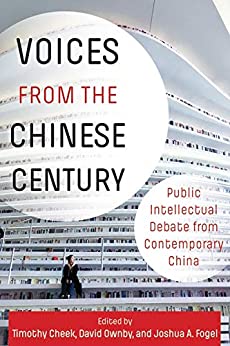
Review of Voices from the Chinese Century, edited by Timothy Cheek, David Ownby, and Joshua Fogel. Columbia, 2019.
Perhaps what is most telling about this anthology of contemporary Chinese intellectuals is how preoccupied its writers are with the ghosts of China’s past, and less with the future the title of Voices from the Chinese Century would suggest. Indeed, the writer whose insights are most incisive is not a contributor at all, but Lu Xun via quotation.
“Whatever kind of citizen you have,” one contributor paraphrases Xun, “that will be the kind of government you have.” The observation also functions as an implicit criticism of this anthology, largely removed from the country’s people and social transformations. The anthology’s editors acknowledge that “academic public intellectuals … hardly describe the entire population of China’s lively, if not free, public sphere.” But the great divergence in perspectives nonetheless captured within its pages do reflect the many possible trajectories for China’s future. And the one conclusion the authors implicitly share, that the status quo cannot hold, affirms that for all its progress, China’s future remains fragile.
What possible trajectories are envisioned here? The editors, three Canadian Sinologists, have organized the volume around Liberal, Left, and New Confucian thinkers. The Liberals broadly champion democratization and human rights; the Leftists embrace the Party’s Maoist heritage and include those who criticize the CCP for straying from its founding ideals; the New Confucians imagine a “moral meritocracy,” perhaps united under a state religion. “The complexity of things at the present time resides in the fact that almost anything you can say about China has some basis in fact,” writes political philosopher Gan Yang, whose essay opens the volume.
Because these are translations of essays intended for a Chinese audience, at least one potential rhetorical distortion, the preoccupation of engaging a Western audience, is removed. This perhaps allows for a more undiluted expression of the writers’ beliefs even if the greater distortion of Chinese intellectual life, the Party, remains. It might also allow for greater openness about the authors’ self-doubts: “We should not think that because we are Chinese, we have a better understanding of China,” Gan continues. “Even Westerners themselves do not necessarily understand the West.”
Many of these essays will indeed challenge Western readers and any preconceived biases about China. As one Confucian writer envisions a tricameral government comprised of an elected house; a second body of meritocratic, Confucian elite; and a third body of Confucius’ descendants, an initial reaction might be dismissive, until on further reflection, one realizes that it is essentially a constitutional monarchy.
These texts – which take the form of essays, speeches, debates, and interviews, and date to as early as 1999 – do not fully engage the Xi era and liberalism’s current crisis of confidence. In recent years, the Communist Party has moved to co-opt Confucianism as an alternative source of legitimacy, amid a broader emphasis on Chinese exceptionalism, heightened antipathy to foreign influence, and resurgent intolerance for dissent. The anthology references, but does not print, other thinkers who see the alternative potential for compatibility between Confucian and liberal thought. If the West seeks to challenge China’s authoritarianism and retain Chinese hearts and minds, they will need to better understand and find a place for aspects of Confucianism in their defense of liberalism.
The past looms heavily over these essays, often channeled through the words of Lu Xun, Kang Youwei, Sun Yat-sen, and, invariably, Mao. Kang may be the least familiar to readers. The Qing era thinker sought to remake the Qing dynasty in the spirit of Meiji Japan and is championed by Confucianists. The through line of this backward gaze, captured by liberal Cai Xia, is that “due to the profound influence of millennia of autocracy … autocracy has been dismantled in ‘form’ but not in ‘spirit.’”
Later, leftist Xiao Gongqin acknowledges that “we cannot say that the cry for democracy … has not been strong,” but chastises liberals who naively believe democracy to be a “simple tool with which to overcome despotism and corruption.” As the editors point out, his argument, that democratization ignores the country’s historical context and that China’s civil society requires further maturation, echoes Sun Yat-sen’s calls for “political tutelage” a century ago.
Cai, whose deployment of Marxist-Lennonist rhetoric in favor of democratization, is one of the anthology’s standout authors. So too is Wang Shaoguang’s savvy attempt to reframe China as a responsive, “representational” democracy in contrast to the West’s shallow, “representative” kind. In compiling this anthology, the editors have created a rich encapsulation of the three major currents of Chinese discourse. But it is Lu Xun again who best summarizes them: “Those previously on top seek restoration, those currently on top seek to maintain their position, and those never yet on top seek reform. So it has been. So it is!”